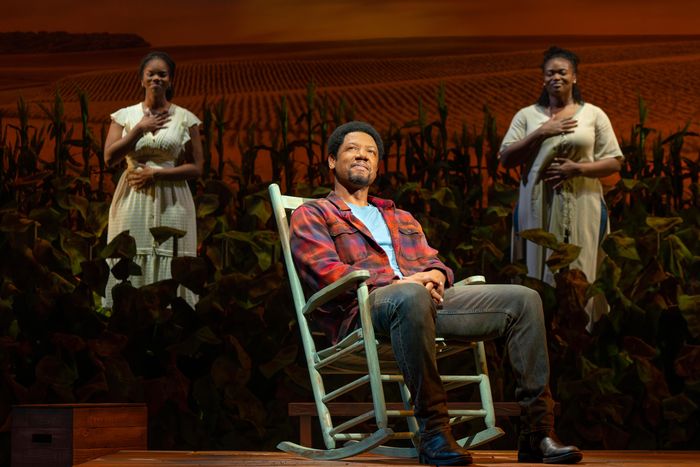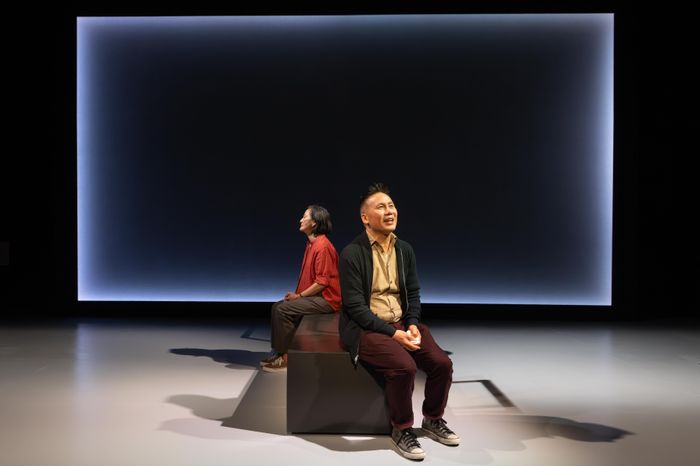
WeÔÇÖre in that liminal space between seasons, in terms of both the weather and the theater: AprilÔÇÖs commercial shows have opened (and in some cases, already closed), the awards campaigns are still running, and the Tonys themselves wonÔÇÖt happen for two weeks. The larger productions opening now operate on a smaller scale, in a similar in-between space. WeÔÇÖre getting a series of journeys between realms, whether geographical or within the self, that come with an ambivalence about both their origins and destinations. Now is the time to go there and back again, and to feel at home neither here nor there.
On Broadway, at the RoundaboutÔÇÖs newly renamed Todd Haimes Theatre, a cast of three leads the revival of Samm-Art WilliamsÔÇÖs Home. All the actors orbit the psyche of one character: Cephus Miles (Tory Kittles), a Black farmer who has made his way back to rural North Carolina. Kittles, who initially conveys age and frailty with a bent back and the quiver of a hand, sits on a rocking chair center stage as HomeÔÇÖs two-part chorus, played by Brittany Inge and Stori Ayers, both berate and praise him. Woman One and Woman Two, as theyÔÇÖre identified, slip between narrating and playing a host of characters in CephusÔÇÖs life, from stodgy church lady to lumbering bus driver (Ayer is particularly funny when piloting a Greyhound). In WilliamsÔÇÖs rendering, Cephus has innate na├»ve moral strengthÔÇöÔÇ£If there was ever a woman or man who has everlasting grace in the eyes of God,ÔÇØ says Ayers, ÔÇ£itÔÇÖs the farmer woman ÔǪ and manÔÇØÔÇöbut heÔÇÖs run afoul of the expectations of mid-century America. HeÔÇÖs been imprisoned after refusing to serve in the Vietnam War, believing it would contradict the BibleÔÇÖs commandments to love thy neighbor and not kill, and after being released, he lost himself in the temptations of a ÔÇ£very, very large American cityÔÇØ up north. Back home, heÔÇÖs starting to heal, though still yearning for his lost childhood sweetheart Pattie Mae (whenever she appears, sheÔÇÖs played by Inge, who lends her a beatific upright posture) and railing against God, who he believes has abandoned him for a vacation in ÔÇ£the sun-soaked, cool beaches of Miami.ÔÇØ
Home was a defining work for Williams, who received a Tony nomination for the original production, first staged by the Negro Ensemble Company Off Broadway in 1979. (He died just as this production started performances.) Williams had created Cephus out of his own experiences growing up in North Carolina and his later loneliness up North, writing with a warmth and folksy small-town humor behind rose-colored glasses, aiming to please and wring out laughs. Kittles, when he morphs back to playing a sprightly younger version of Cephus, has a rogue charm and winning comedic timing. (Williams himself went on to be a writer and executive producer of Fresh Prince of Bel-Air.) Kittles can sell a good yarn, and thatÔÇÖs is a lot of what his character does, whether heÔÇÖs reminiscing about shooting craps in the whites-only part of a cemetery (ÔÇ£thatÔÇÖs where the nice cement vaults areÔÇØ) or about a local character who pretended to be Cherokee and unable to speak English to get out of paying his debts. The humor, as that story may imply, is very much of its time. WilliamsÔÇÖs play is responding to trends in the heat of its momentÔÇöurban decay, white flight, national opinion on the Vietnam WarÔÇöand renders them broadly (as in some of the caricatures of city scumbags) but also with immediacy. Home happens to be back at the same time as The Wiz, and Arnulfo MaldonadoÔÇÖs cornfield set inevitably puts the two works into conversation: TheyÔÇÖre wrestling with the legacy of the Great Migration a generation later, wondering where comfort might lie for Black Americans. When you think of home, as the song goes, what place do you think of?
Home hasnÔÇÖt been back on Broadway since that first run, and as he did with last fallÔÇÖs Purlie Victorious, its director, Kenny Leon, has talked about wanting to re-insert this Black classic into the canon. Purlie, however, came with a gleam of wicked humor that still drew blood, plus that all-out performance by Kara Young. HomeÔÇÖs edges are softer, and LeonÔÇÖs production gets stuck in the sentimental. In bringing the play back, heÔÇÖs proven that there might be plenty in WilliamsÔÇÖs work thatÔÇÖs worth re-exploring, but he hasnÔÇÖt gotten all the spelunking done himself. There are unresolved tensions in WilliamsÔÇÖs script that could use some pressure, like the way CephusÔÇÖs seeming nostalgia exists alongside his acknowledgment of segregation, or how economic realities underlay his journey north (and only a deus ex machina allows his return to the South). LeonÔÇÖs approach is serviceable and too respectful. He has, in the last few years, become one of BroadwayÔÇÖs busiest directorsÔÇönext season, heÔÇÖll do Our Town and Othello, both with big names from film and televisionÔÇöand, whether because of the pace of his output or not, his approach can drift toward the rote and straightforward. In Home, he ties up the story with a neat bow, as Cephus finds peace and believes God himself has returned from Miami. WilliamsÔÇÖs ending is neat, but thereÔÇÖs space for a director to complicate it. Leon lets it all rest.
Around the corner at Second Stage, the restlessness of Breaking the Story may be its defining feature, and itÔÇÖs also where Alexis ScheerÔÇÖs drama outpaces her ability to manage it. As with Home, the story is about a return to the pastoral, at least ostensibly: Marina (Maggie Siff, always two ticks better than her material) is a broadcast journalist whoÔÇÖs trying to settle down after a career spent in war zones. SheÔÇÖs impulsively bought a home in Wellesley, MassachusettsÔÇöMyung Hee ChoÔÇÖs set surrounds a skeletal shape of a house with filled up with eerie video screens that display close-ups of flowers, occasionally interrupted by footage of armed conflictÔÇöand equally impulsively decides to jump into a marriage with her longtime cameraman, played by Louis Ozawa (finding the dopey sweetness in a guy named ÔÇ£BearÔÇØ). MarinaÔÇÖs friends and family (Julie Halston chews scenery and half her vowels as her very Boston mother) descend on the scene to plan that wedding, while she also grapples with PTSD that throws her and us back into the midst of some of her most harrowing reporting.
Scheer, who got a bunch of buzz with the morally knotty Our Dear Dead Drug Lord (and then apparently worked on rewrites of Bad Cinderella), is good with a certain cynical wit, but her aim here is scattered. The piece is most compelling as a journey into the shattered mindset of an adrenaline junkie, and Siff buries fragility just under a veneer of posturing confidence. But Scheer gets sidetracked into eddying, abstracted debates between characters about journalism and politics. The fights between Marina and her daughter, Cruz (Gabrielle Policano), and Marina and her prot├®g├®, Nikki (Tala Ashe), end up reiterating well-worn talking points about objectivity: Marina believes in it, the younger women think itÔÇÖs a myth, et cetera. They tell us little about these particular characters as individuals. Marina, though Siff lends her fractured poise, is always an idea of a certain type of woman, not a person in and of herself. I could go on Twitter and learn just as much.
Jo Bonney, directing, conjures an air of dread and surreality, amping each performance up a little past the literal. Between a few scenes, Cruz sings pop songs inspired by her motherÔÇÖs diaries in front of footage of violence. ItÔÇÖs one of several choices that might shock if only it had more grounding in character. Similarly, everyone in the midst of wedding planning keeps talking about what theyÔÇÖd do if America suddenly collapsed into civil warÔÇöwhich, unfortunately, does also make you think about Alex GarlandÔÇÖs similarly garbled film about conflict reporting, Civil War. ThereÔÇÖs a lust for blood that comes alongside the cynicism that I wished had been examined more deeply: The idea that war journalism inspires an addiction to conflict is as old as the genre, but the idea that the omnipresent and unceasing flow of footage from war is making even civilians addicted may be a new twist. Though Breaking the Story doesnÔÇÖt have Marina reporting from Gaza specifically, I couldnÔÇÖt stop thinking about the genocide there, how even those protesting the violence do so by relentlessly sharing images of horror. The play may dabble in those implications, the notion that even in the suburbs Americans are yearning for collapse, but Scheer dodges and tacks away from them. MarinaÔÇÖs particular nightmare ends with a twist, treated as a gut punch ÔÇö but itÔÇÖs one that any reporter worth their salt would have seen coming.
Of the three journeys into another realm I witnessed over the course of a weekend, the most affecting lay in crossing the boundaries between nations. In Shayan LotfiÔÇÖs What Became of Us, two siblings live with subtly different legacies: The older and more deferential Q is born in ÔÇ£The Old Country,ÔÇØ whereas the younger and more rebellious Z is born in ÔÇ£This Country.ÔÇØ The nations go unnamed, and LotfiÔÇÖs script might adapt to a variety of settings and performers. While I saw Rosalind Chao as Q and BD Wong as Z, the Atlantic is switching in Shohreh Aghdashloo and Tony Shalhoub for the later part of the run. Initially, the vagueness frustratesÔÇöyou tend to notice how Lotfi will zero in details as specific as the color of a door, while leaving nationality pointedly unstatedÔÇöbut over time it casts a certain spell. He has a clear grasp of character, and an unsentimental eye for family conflict, such that you experience a kind of double vision, seeing Q and Z both as individuals and as part of larger repeated patterns.
Chao and Wong both do well under Jennifer ChangÔÇÖs warm but firm direction. (I did keep wondering how Aghdashloo and Shalhoub might approach the roles differently, though that ended up feeling like a complement, not a detriment, to what I was watching; thereÔÇÖs enough here to contain multiple interpretations.) Chao, as Q, enters first and narrates her story of coming to This Country young, building up the defensive armor of having to learn the language and explain things to her parents, before the arrival of her baby sibling. Chao has an inherent down-to-earth franknessÔÇöeven, as IÔÇÖd recently seen her in The Three Body Problem, while plotting to destroy humanityÔÇöand here it comes out in the form the pinched seriousness of an older sister, accommodating to a fault. WongÔÇÖs Z is the rambunctious baby, rebellious from an early age, unfocused at school and experimenting with gender norms, eventually fleeing across the country to culinary school. (One of LotfiÔÇÖs revealing, short-story-like observations is that no one had seen Z cook before then.) In the part, Wong is sweetly winning, tinged as many rebels are with wounded melancholy. As Q and Z trade narrationÔÇöthere is something of Love Letters in the construction, even if itÔÇÖs not literally epistolaryÔÇöthey often speak to each other across a low black bench that divides Tanya OrellanaÔÇÖs set, a physical border that stands in for emotional distance as well. Over the years, the two siblings fight, stop talking, and haltingly make their way back to each other. Lotfi doesnÔÇÖt tie their lives up neatly, allowing the characters both pain and grace.
Home is at the Todd Haimes Theatre.
Breaking the Story is at the Tony Kiser Theater.
What Became of Us is at the Atlantic TheaterÔÇÖs Stage 2.




